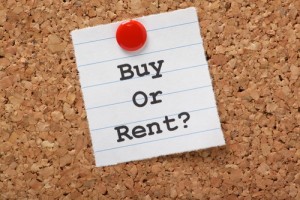
Where does your money go? Via Shutterstock
Home ownership may sound appealing, but truth be told it’s just not right for everyone. There are many personal and financial factors that need to be considered when determining whether it’s the right decision for you. Moving into a new home can be exciting, whether you have purchased it or decided to rent, so take the time to weigh up the options carefully on both.
Can you Afford to Buy?
The first step is to decide if you are even in a position to buy at the current time. Getting a mortgage is a huge financial commitment that requires a strong credit rating and funds for a deposit, as well as moving expenses. It may be possible to secure a mortgage without a large down payment as many financial institutions offer home loans on a low deposit, as little as 3 percent.
When determining whether you are in a position to buy, it’s important to do some financial planning. Be sure to account for expenses related to homeownership, such as property taxes, repairs, insurance and maintenance costs, which are not usually your responsibility as a tenant.
There are helpful and informative mortgage calculators available on the internet to give you an estimate of how large a payment you can afford, and how that equates to a mortgage.
The Pros of Buying a Home
Although more costly, and requiring much more of a long-term commitment, home ownership has many benefits. The most obvious advantage of purchasing a house is that when you’ve paid your home loan off, you own the property outright. Other advantages to homeownership include:
● Freedom to renovate or make changes at your own discretion
● having collateral and established credit for future borrowing
● having your money work for you, instead of paying off a property for the landlord
● Monthly home loan payments are cheaper or comparable to rent
● Enjoy the comfort and security of knowing you are staying in one place for long period of time, and no one can make you move
● Paying off your home loan can make retirement more affordable
Downsides of Home Ownership
Home ownership is a fantastic option for some people, but it is important to be aware of potential drawbacks as well. Real estate is a big commitment and can be very costly. Costs can rise when interest rates climb, and it can be hard to predict when or by how much the rates will fluctuate. One person I know walked away from her mortgage during the Great Recession. Owning a home can also incur costs associated with renovations and repairs, having a large impact on your disposable income. Not everybody enjoys this lack of flexibility, making it more difficult to change jobs, relocate or sell.
The Pros of Renting a Home
Renting a home is an excellent option for people who aren’t in a position to buy, or for those who aren’t best suited to the obligations associated with owning a property. Other benefits of renting a property include:
● There are usually no maintenance or repair costs associated with renting; landlords are responsible for keeping the property safe and functional
● Tenants are not responsible for the taxes on the property
● There is no down payment required to move into a rental property except for perhaps one month’s rent upfront
● Rent payments are controlled and remain fixed for the term of the lease agreement
● As a tenant, you have the flexibility to relocate with minimal hassle
Downsides of Renting
Renting is not ideal for everybody, especially if you can live with your parents for free. Some people find it a waste of money to make regular payments on a property they will never own. In addition to this they are cautious of the lack of security associated with renting, knowing they can be asked to move, or the property can be sold by the owners, leaving no say to the tenant. Regardless of your decision, moving into a new home is an important life event and should be considered seriously, factoring in all possibilities before deciding one way or another.








Leave a Reply